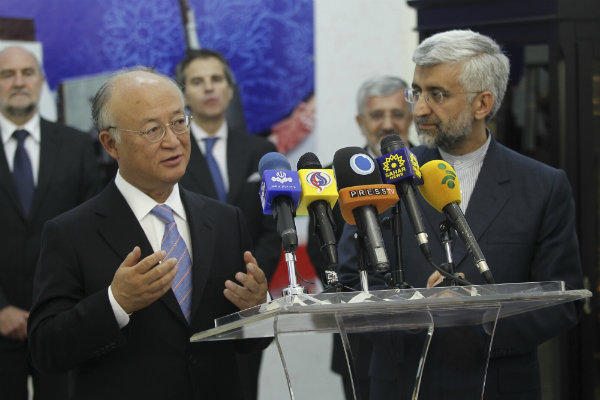Baghdad’s airport opened Wednesday morning a day after a dust storm stopped flights, officials said, ahead of talks between world powers and Iran over Tehran’s nuclear program.
 Baghdad's airport opened Wednesday morning a day after a dust storm stopped flights, officials said, ahead of talks between world powers and Iran over Tehran's nuclear program.
Baghdad's airport opened Wednesday morning a day after a dust storm stopped flights, officials said, ahead of talks between world powers and Iran over Tehran's nuclear program.
The second round of talks came after the International Atomic Energy Agency Director General Yukiya Amano has visited Iran.
Amano said Tuesday, upon his arrival in Vienna, that he expected to sign a deal with Iran “quite soon” on the arrangements for further investigation into the country’s nuclear activities.
Meanwhile, during a meeting with Iraqi Prime Minister Nouri al-Maliki in Baghdad Tuesday, the secretary of Iran’s Supreme National Security Council, Saeed Jalili, has said he is optimistic that a new round of talks between Tehran and the six major powers will mark the dawn of a new era in their cooperation, the Mehr News Agency correspondent reported.
For his part, US House spokesman Jay Carney said the agreement on nuclear talks in Baghdad is a positive step in the process, and that Iran should work to prove its nuclear program is peaceful.
The first round of talks was held in mid-April in Istanbul.
Iran insists its nuclear program is peaceful, but much of the international community suspects it is masking attempts to join the elite club of nations with nuclear weapons.
During the last month, foreign pundits and analysts considered the Grand Ayatollah Sayyed Ali Khamenei’s fatwa on Iran nuclear program a sign of the peaceful purposes for enriching uranium in the Islamic Republic.
World powers and Iran are hoping to lay the groundwork for an end to the long-running crisis, while diplomats hope to be able to at least set the parameters of what will be a process of more regular talks of confidence-building measures.
The Iranian nation believes that access to nuclear technology is one of their inalienable rights, which is non-negotiable.
Meanwhile, Iranian officials have done their utmost to build trust with the Western side and to clear up the ambiguities about the country’s nuclear activities. The recent successful round of talks in Istanbul clearly proved Iran’s goodwill and intention to restore the international community’s confidence and trust.
European Union foreign policy chief Catherine Ashton will be representing world powers in the nuclear negotiations and Jalili will be heading the Iranian delegation.
G5+1 includes the five permanent members of the UN Security Council -- the US, Russia, China, Britain and France, plus Germany.